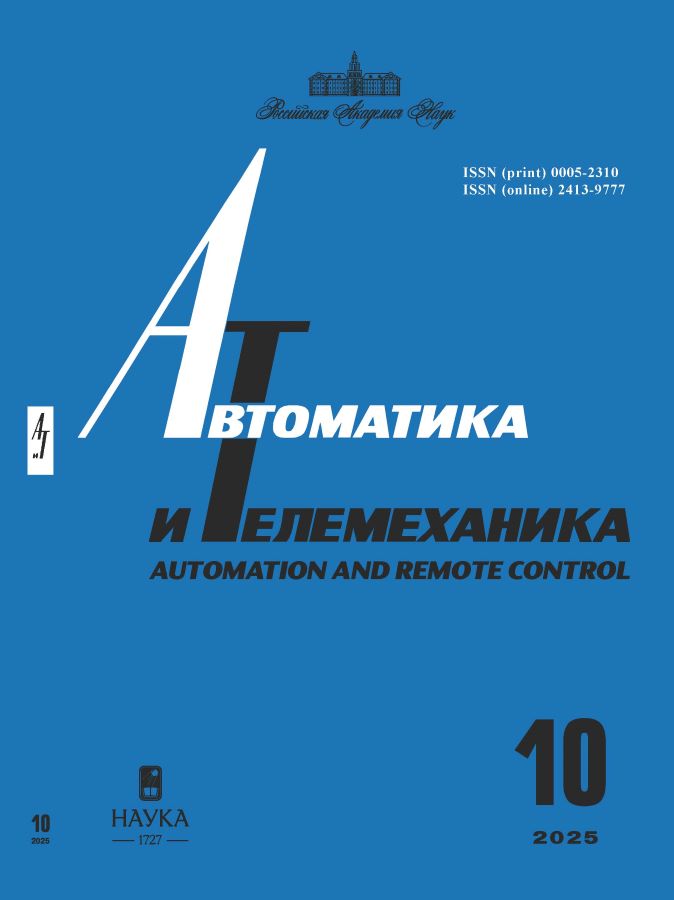Postroenie effektivnykh investitsionnykh portfeley s veroyatnost'yu padeniya final'nogo kapitala investora nizhe ustanovlennogo urovnya v kachestve mery riska
- Authors: Gridin V.N1, Golubin A.Y.1,2
-
Affiliations:
- Center of Information Technologies in Design, Russian Academy of Sciences
- National Research University Higher School of Economics
- Issue: No 4 (2023)
- Pages: 131-144
- Section: Control in Social Economic Systems
- URL: https://ruspoj.com/0005-2310/article/view/646782
- DOI: https://doi.org/10.31857/S0005231023040086
- EDN: https://elibrary.ru/QILIGV
- ID: 646782
Cite item
Abstract
The paper presents a constructive description of the set of all efficient (Pareto-optimal) investment portfolios in a new setting, where the risk measure named “shortfall probability” (SP) is understood as the probability of a shortfall of investor’s capital below a prescribed level. Under a normality assumption, it is shown that SP has a generalized convexity property, the set efficient portfolios is constructed. Relations between the set of mean-SP and the set of mean-variance efficient portfolios as well as between mean-SP and mean-Value-at-Risk (VaR) sets of efficient portfolios are studied. It turns out that mean-SP efficient set is a proper subset of the mean-variance efficient set; interrelation with the mean-VaR efficient set is more complicated, however, mean-SP efficient set is proved to be a proper subset of mean-VaR efficient set under a sufficiently high confidence level. Besides a normal distribution, elliptic distributions are considered as an alternative for modeling the investor’s total return distribution. The obtained results provides the investor with a risk measure, that is more vivid than the variance and Value-at-Risk, and with determination of the corresponding set of effective portfolios.
About the authors
V. N Gridin
Center of Information Technologies in Design, Russian Academy of Sciences
Email: info@ditc.ras.ru
Odintsovo, Moscow oblast, Russia
A. Yu Golubin
Center of Information Technologies in Design, Russian Academy of Sciences; National Research University Higher School of Economics
Author for correspondence.
Email: agolubin@hse.ru
Odintsovo, Moscow oblast, Russia; Moscow, Russia
References
- Markowitz H. Portfolio Selection // J. Finance. 1952. V. 7. P. 77-91.
- Gaivoronski A., d Pflug G. Value at Risk in Portfolio Optimization: Properties and Computational Approach // J. Risk. 2004. V. 7. No. 2. P. 1-31.
- Shiba N., Xu C., Wang J. Multistage Portfolio Optimization with VaR as Risk Measure // Int. J. Innovat.Comput., Inform. Control. 2007. V. 3. No. 3. P. 709-724.
- Rockafellar R.T., Uryasev S. Conditional value-at-risk for general loss distributions // J. Bank. Finance. 2002. V. 26. P. 1443-1471.
- Szego G. Measure of Risk // Eur. Oper. Res. 2005. V. 163. P. 5-19.
- Rockafellar R.T., Uryasev S., Zabarankin M. Generalized Deviations in Risk Analysis // Finance Stochast. 2006. V. 10. No. 1. P. 51-74.
- Artzner P., Delbaen F., Eber J.M., Heath D. Coherent measures of risk // Math. Finance. 1999. No. 9. P. 203-228.
- Минасян В.Б. Новые меры риска искажения высших моментов распределения потерь. Взаимосвязь с мерами катастрофических рисков // Управление финансовыми рисками. 2021. Т. 68. № 4. С. 302-323.
- Gardoni P., Murphy C. Gauging the societal impacts of natural disasters using a capabilities-based approach // Disasters: Disaster Studies, Policy, Management. 2010. V. 34. No. 3. P. 619-636.
- Gardoni P., Murphy C. Design, risk and capabilities. In Human Capabilities, Technology, and Design, J. van den Hoven and I. Oosterlaken (Eds.). N.Y.: Springer, 2012. P. 173-188.
- Rockafellar R.T., Royset J.O. Risk Measures in Engineering Design under Uncertainty // International Conference on Applications of Statistics and Probability in Civil Engineering (ICASP). N.Y., USA, 2015. P. 1-9.
- Pinar M.C. Static and Dynamic VaR Constrained Portfolios with Application to Delegated Portfolio Management // Optimization. 2013. V. 62. No. 11. P. 1419-1432.
- Duffie D., Pan J. An Overview of Value at Risk // Derivat. 1997. V. 4. P. 7-49.
- Golubin A.Y. Optimal Investment Policy in a Multi-stage Problem with Bankruptcy and Stage-by-stage Probability Constraints // Optimization. 2021. https://doi.org/10.1080/02331934.2021.1892674
- Кибзун А.И., Кан Ю.С. Задачи стохастического программирования с вероятностными критериями. М.: Физматлит, 2009.
- Alexander G.J., Baptista A.M. Economic Implications of Using a Mean-VaR Model for Portfolio Selection: A Comparison with Mean-variance Analysis // J. Econom. Dynam. Control. 2002. V. 26. P. 1159-1193.
- Guo X., Chan R.H., Wong W.K., Zhu L. Mean-variance, Mean-VaR, and Mean-CVaR Models for Portfolio Selection with Background Risk // Risk Manag. 2019. V. 21. P. 73-98.
- Bazara M.S., Shetty C.M. Nonlinear Programming: Theory and Algorithms, New York: Wiley, 1979.
- Merton R.C. An analytic derivation of the efficient portfolio frontier // J. Finan. Quantit. Anal. 1972. No. 7. P. 1851-1872.
- Hull J.C., White A. Value-at-risk when daily changes in market variables are not normally distributed // J. Derivat. 1998. No. 5. P. 9-19.
- Landsman Z., Valdez E.A. Tail Conditional Expectations for Elliptical Distributions // North Amer. Actuarial J. 2003. V. 7. No. 4. P. 55-71.
- Alexander G.J., Baptista A.M. A comparison of VaR and CVaR constraints on portfolio selection with the mean-variance model //Management Sci. 2004. V. 50. P. 1261-1273.
Supplementary files











